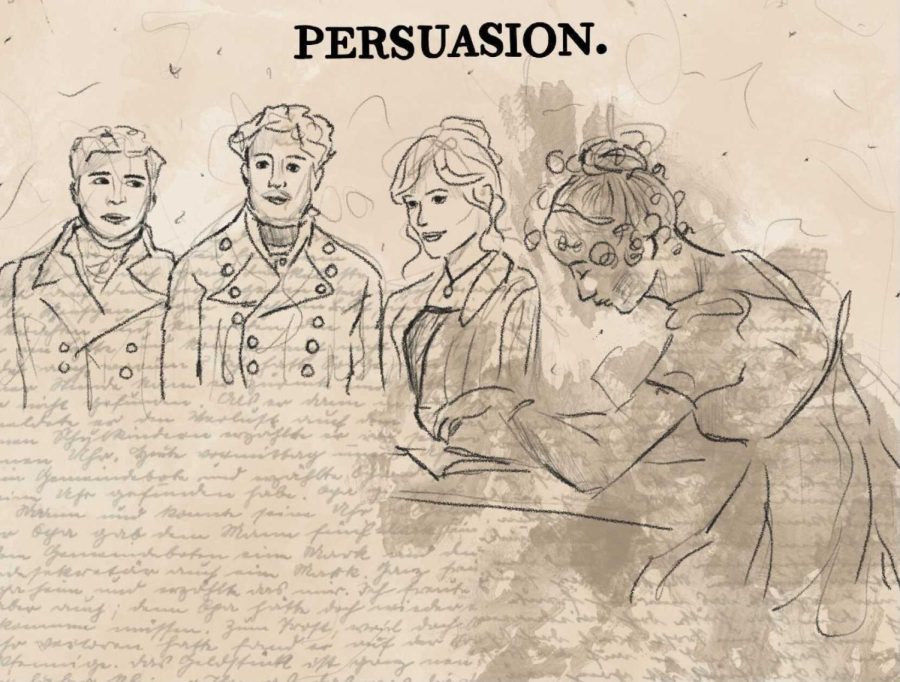A Dubiously Received ‘Persuasion’
The aspect of Jane Austen’s work that has moved readers for generations is the spirit of her characters and how profoundly they experience emotions. While other Austen adaptations have captured this essence, Persuasion (2022) fails to encompass the complexity of the original story. Graphic by Hadley Norris.
August 18, 2022
There’s a moment in the 2005 Pride and Prejudice adaptation that has all but transcended the spare few seconds it takes up in the film itself, reverberating through the frantically beating hearts of hopeless romantics everywhere, even once the final credits have begun to roll. Though Elizabeth and Mr. Darcy haven’t yet confronted the inner turmoil their unexpected feelings for each other have caused, after a moment of hesitation, he reaches for her ungloved hand to help her into a carriage. The interaction takes only the briefest of moments, and though neither character allows any repressed feelings of emotional upheaval to disturb their perfectly blasè masks, the echoes of their fleeting touch seem to still hang in the air even once Darcy walks away; the surprise Elizabeth feels is palpable, Darcy’s longing and confusion evident in the way his hand tremors at the memory of Elizabeth’s touch even once he turns his back to her.
The scene feels entirely like an encapsulation of one of the most paramount factors of Jane Austen’s writing. As audiences watch Elizabeth and Mr. Darcy on screen, romance and angst seem to come to life in the air around the characters, elevating from mere concepts to living, breathing things that wreak havoc on unsuspecting people’s lives. Austen’s ability to weave emotion — longing, regret, and oftentimes fanaticism — into the spirit of her characters is one of the reasons her work has endured for so long, continuing to be adapted and rebooted, and reintroduced to new generations. It’s why that infinitesimal interaction between Elizabeth and Mr. Darcy on screen continues to enthrall audiences. Because, like Austen’s writing, it demonstrates how romance can have depth, be just as jarring and painful as it is chocolates and roses. While Pride and Prejudice is more often the latter, its characters predictably finding love in the final act even after falling and flailing and misjudging each other, Austen’s other works demonstrate just as well how very painful and filled with heartache the time between an introduction and a happy ending can be.
Persuasion, Austen’s last fully completed novel which was published posthumously in 1817, opens with its love story already over. What subsequently takes place is a study in the delicate art of feeling incapacitating regret without being able to express it. The novel is bitter and melancholy, and its heroine, Anne, is thoughtful and reflective despite her suffering, or perhaps because of it. She’s easy to sympathize with because of how unfairly the odds have worked against her favor, yet her careful nature and exact understanding of just how much she has lost prevents her from appearing pathetic and overly melodramatic.
The 2007 film adaptation of Persuasion, directed by Adrian Shergold, captured the aura of the novel perfectly. Its muted and stormy color palette embellishes the unspoken and unbreakable tension between Anne and her lost love, Captain Fredrick Wentworth. In many ways, the nuances and theme of the story ring even truer today than they did then. At times, social media seems to have created an ever-expanding chasm in the realm of human connection, only compounded by lockdowns and isolation. A collective craving for emotional intimacy seems to have taken hold, much like the silent longing that takes place between the remorseful Anne, who drove Wentworth away at her family’s behest due to his lack of social standing, and her jilted lover, who despite Anne’s rejection has never stopped caring for her. Their painful reunion is filled with words unsaid, and while it seems like a story with a distinct lack of dialogue between its two main characters wouldn’t make for good filmography, both the 2007 adaptation and the Roger Mitchell-directed 1995 adaptation evoke the feelings of the original manuscript beautifully.
Despite Persuasion already having proved itself as a timeless story that can translate well to film, the Netflix-backed July adaptation of the story, which reimagines Anne (portrayed by Dakota Johnson) as an offbeat heroine prone to breaking the fourth wall and smearing jam on her face, has been received poorly by both critics and audiences alike. Many took issue with the modern tone of the film, which saw Johnson staring glibly into the camera delivering lines that lament the difficulties of men who are ‘exes’ and ‘tens’, as well as the fact that the film’s actors and set simply couldn’t shake the modern-day orientation of their styling and manner once the cameras started rolling.
While both criticisms undoubtedly hold true, it’s not as if Austen hasn’t been adapted successfully with those characteristics before. 2020’s EMMA. (based on the novel of the same name) stands as a visual masterpiece of an adaptation that showcases how a film can take on an unorthodox and whimsical tone but still relate its timeless story. Clueless and Bridget Jones’s Diary, which completely modernized Emma and Pride and Prejudice respectively, are both accepted as fan-favorite adaptations and cult classics. While it’s true that those films were able to channel modernity more successfully because their origin stories contained far greater elements of humor and irony, nearly all of Austen’s stories — even her gloomy ones — make fun of their characters, showcasing the absurdities of trying to find the most efficient point of intersection between love, money, and marriage. Why, then, does Netflix’s Persuasion leave its characters and plot hanging out to dry in the face of lackluster reception, especially in a time when its themes are more relevant than ever?
The reality lies in the fact that though Austen may make her characters the subject of subtle ridicule, she still cares about them, enough to craft them into people whose heartbreaks can take hold in readers’ minds. In Netflix’s Persuasion, Anne and Wentworth’s heartbreak is all ridicule and no grief, diluting the strength of Anne’s reserved and humble character in favor of showcasing her as the more popularly ‘feisty heroine’ archetype, while butchering the complexities of Anne and Wentworth’s relationship and lasting love to instead try for a laugh from the audience when the pair embarrass themselves around each other. It seems like none of the characters seem to care much about anything, existing only as vehicles for jaunty quips that supposedly service a modern audience (‘Now I’m single and thriving’), the actors stiff enough that it’s almost impossible not to imagine they had been rehearsing their lines just a moment before. The whole spectacle is miles removed from the feelings evoked by Austen’s original writing, which is where it fails. Language can be modernized, but emotion can’t.
“I am half agony, half hope. Tell me not that I am too late, that such precious feelings are gone forever. I offer myself to you again with a heart even more your own than when you almost broke it,” Wentworth writes to Anne in the book’s final chapter, declaring his undying love. Though Persuasion à la Netflix may not have been able to recreate those feelings in his letter crafted by Austen’s pen, in comparison with her words it almost seems as if the adaptation was setting herself up for an impossible task. So until a film comes along that can capture that feeling of agonizing regret and love not yet lost, audiences will simply have to be content with re-reading Austen’s writing and rewinding on Elizabeth and Darcy holding hands yet again.



